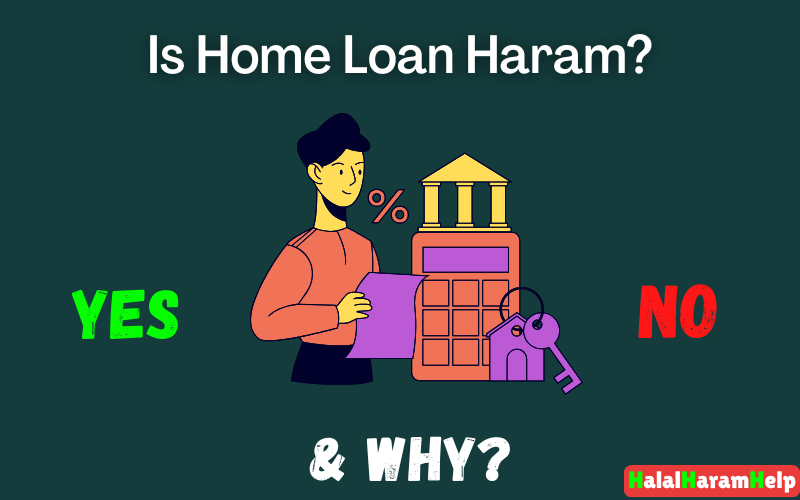In today’s world, buying a house has become increasingly difficult due to rising property prices and financial constraints.
Many individuals, including Muslims, look to home loans as a way to make homeownership more accessible.
However, for Muslims, the key concern is whether taking out a home loan is permissible under Islamic law.
This is largely due to the interest (riba) involved in conventional loans, which is prohibited in Islam.
In this article, we will explore whether home loans are considered halal or haram and provide insight into alternative options for Muslims seeking to buy a home in accordance with Islamic principles.

Is Home Loan Haram?
Yes, taking a conventional home loan that involves interest (riba) is considered haram (forbidden) in Islam.
However, there are alternative options, such as Islamic home financing models, that comply with Sharia law and do not involve interest.
Understanding the Issue: In Islam, the concept of riba, or interest, is strictly prohibited. This is because charging or paying interest is seen as an unjust practice that leads to exploitation, violating the principles of fairness and equity.
Conventional home loans offered by banks typically involve paying interest over time, which makes them haram for Muslims to use under normal circumstances.
Why is Riba (Interest) Haram? Riba is a form of exploitation in financial transactions.
The Quran clearly forbids it, stating that interest-based transactions are unjust because they benefit one party at the expense of the other.
The Quran in Surah Al-Baqarah (2:275) explains:
Those who charge usury are in the same position as those controlled by the devil’s influence. This is because they claim that usury is the same as commerce. However, God permits commerce and prohibits usury.
For Muslims, paying or receiving interest on loans violates these teachings. Therefore, taking out a conventional home loan that charges interest falls into the category of haram practices.
You might also like to know is credit card cashback halal.
Alternative Options For Home Financing In Islam
While conventional home loans are haram, there are alternative financing options that align with Islamic principles and can help Muslims secure a home without violating their faith.
1. Islamic Banks and Sharia-Compliant Home Financing: Islamic banks offer home financing solutions based on the principles of Sharia law, which prohibits interest.
These banks use ethical models such as Murabaha and Musharakah Mutanaqisah to help Muslims purchase homes.
Murabaha: In this model, the Islamic bank buys the property on behalf of the customer and then sells it to the customer at a higher price, allowing them to pay in installments.
The bank does not charge interest, but instead, the price increase is an agreed-upon profit margin. This is not considered interest because the transaction involves an asset (the house), and the bank takes on some financial risk.
Musharakah Mutanaqisah: This is a partnership model where both the bank and the borrower share ownership of the property.
The borrower gradually buys out the bank’s share over time until they own the property fully. The bank receives a share of the property’s value in return for its initial investment.
Both of these models comply with Islamic law as they avoid interest and ensure fairness in the transaction.
2. Rental Properties: If purchasing a house through financing is not an option, renting can be a viable solution.
Islam permits renting homes, and it can be an ideal choice for those who cannot afford a home purchase without resorting to conventional loans. Renting allows individuals to have a place to live without engaging in interest-based financial agreements.
3. Saving for a Home: Saving money over time is one of the most straightforward and halal ways to buy a house.
By carefully budgeting and setting aside savings, individuals can eventually afford to purchase a home without resorting to loans or financing.
This option may take longer, but it ensures that the transaction remains fully halal and free from any interest charges.
4. Seeking Affordable Housing: Looking for affordable housing within one’s budget is another way to avoid loans.
By considering smaller or less expensive homes, individuals may find it easier to purchase a property without the need for external financing.
This approach can reduce the financial burden and help avoid the need to take on interest-based loans.
Also see is life insurance halal.
Can You Take A Conventional Loan In Emergency Situations?
Islamic scholars generally agree that if someone is in a dire situation where owning a home is necessary (for example, for marriage or family reasons), and no halal alternatives are available, they may be allowed to take a conventional loan in extreme cases.
However, this should only be considered as a last resort. It is essential to make every effort to seek alternatives, such as approaching Islamic banks or saving up for a property, before considering a conventional loan.
You can also learn is Mortgage halal.
Conclusion
In Islam, home loans that involve interest (riba) are considered haram because they contradict the principles of fairness and justice in financial dealings.
However, Muslims are not left without options. Islamic banks offer Sharia-compliant financing models that provide an ethical alternative for purchasing homes.
Additionally, renting, saving, or looking for affordable housing are viable options that allow Muslims to buy homes without resorting to haram practices.
Always prioritize alternatives that align with Islamic values to ensure financial transactions remain halal and ethical.


